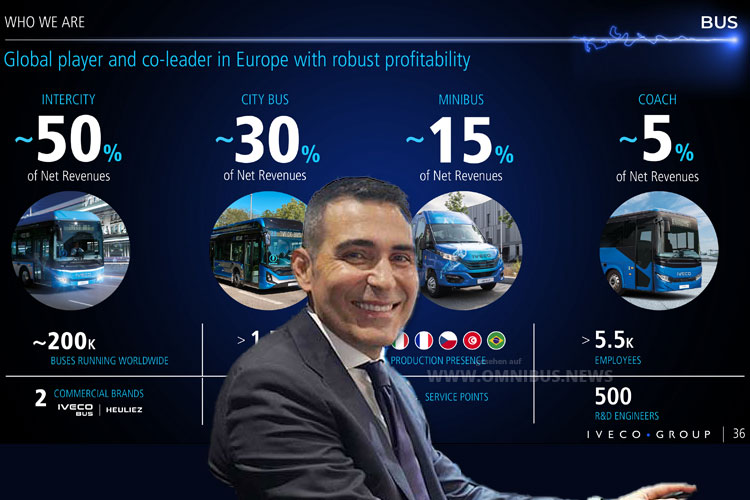
Die Bussparte der Iveco Group sei gut aufgestellt, so Nucera, der Auftragsbestand für Elektrobusse habe sich bis 2023 vervierfacht. Foto: Iveco, Schreiber; Montage: omnibus.news
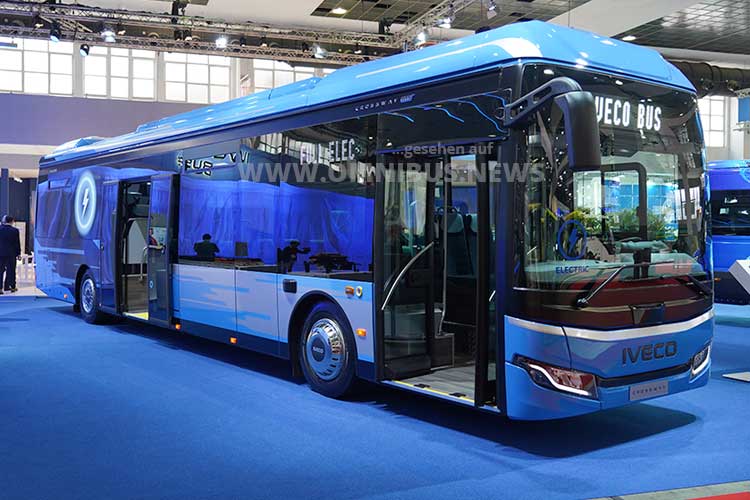
Kaum hatte der Crossway LE Elec seine Premiere, da meldet Iveco Bus auch schon erste Großaufträge (z.B. Qbuzz mit 102 Einheiten) für den Primus im Überlandsegment, der nun auch als BEV-Bus verfügbar ist. Foto: Schreiber
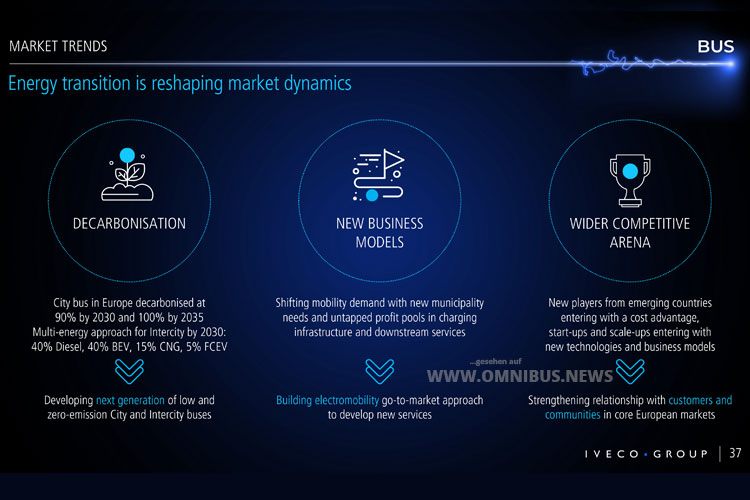
Die Buswelt ist mehr den je im Wandel – nicht nur mit Blick auf die Antriebe, sondern beispielsweise auch mit Blick auf Geschäftsmodelle. Foto: IvecoGroup
Am gestrigen Capital Market Day gab die Iveco Group (mit der Bussparte Iveco Bus) einen Ausblick auf eine spannende Zukunft: Man blicke positiv auf die kommenden Jahre, der Konzern erwarte bis 2028 einen Nettoumsatz von 19 Milliarden Euro – und einen bereinigten Nettogewinn von 0,9 Milliarden Euro.
Damit nicht genug: „Heute verpflichten wir uns mit einem neuen Plan zu einer Beschleunigung unseres Produktportfolios, stärkeren und diversifizierteren Partnerschaften und einer größeren Entschlossenheit, Nachhaltigkeit zu verfolgen“, sagte Gerrit Marx, CEO der Iveco-Gruppe, zu Beginn des Events.
Und weiter: „Wir investieren weiterhin in die Fabriken in Italien. (…) Wir prüfen jedes Geschäft, in dem es uns an Fähigkeiten und Technologie mangelt. Und wir suchen nach Möglichkeiten, die uns helfen, besser oder schneller zu arbeiten und die einen Mehrwert für die Gruppe darstellen.“
Die Iveco Group werde von 2024 bis 2028 mehr als 5,5 Milliarden Euro investieren und sich auf drei Schlüsselbereiche konzentrieren: Energiewende, künstliche Intelligenz und autonomes Fahren. Der Strategieplan der Italiener sieht auch eine Investition für die Bussparte von rund 600 Millionen Euro in fortschrittliche Technologien zwischen 2024 und 2028 vor.
Autonomes Fahren ist kein neuland bei Iveco Bus: Mit Easy Mile haben sich 2017 im Rahmen des STAR-Projekts mit Sector, Transpolis, ISAE-SUPAERO, der Université Gustave Eiffel, Inria, Michelin und Iveco Bus zusammengeschlossen, um die Technologie zur Automatisierung der Busse zu entwickeln.
Ziel der Zusammenarbeit: die Entwicklung des ersten fahrerlosen, autonomen Standardbus-Prototypen im Jahr 2021, der sich unter realitätsnahen Bedingungen betreiben lässt. Nach Angaben von Iveco habe der Prototyp seine Eignung für den autonomen Betrieb auf Schnellbusspuren (BRT) und auf Privatgrundstücken jetzt unter Beweis gestellt.
Darauf ruhen sich die Italiener aber nicht aus, wie Domenico Nucera, Präsident der Bus-Sparte der Iveco Group, gestern deutlich machte: „Wir werden 300 Millionen Euro in eine modular aufgebaute, elektrisch angetriebene Fahrzeugarchitektur investieren. Die Batterien werden dabei in die Fahrzeugstruktur integriert. So werden wir Gewicht reduzieren, die Fahrgastkapazität zu erhöhen und damit die Reichweite noch einmal steigern“.
Nucera machte deutlich, dass die Personenbeförderung für Iveco Bus emissionsfrei sei. Elektrisch angetriebene Stadtbusse sollten in Europa bis 2030, also in nur 6 Jahren, 90 % ausmachen. Der Omnibusmarkt sei im Wandel und unter Druck, neue Wettbewerber wären im Anmarsch, neue Geschäftsmodelle drängen auf den Markt.
Die Bussparte der Iveco Group sei gut aufgestellt, so Nucera, der Auftragsbestand für Elektrobusse habe sich bis 2023 vervierfacht. Und: 1.500 Zero-Emission-Busse hätte man Ende 2023 in den Auftragsbüchern. Außerdem freue es ihn, dass der im letzten Jahr neu vorgestellte BEV Crossway LE sehr gut angekommen wäre. (IvecoGroup/PM/Sr)
Fehler im Beitrag gefunden? Jetzt melden!
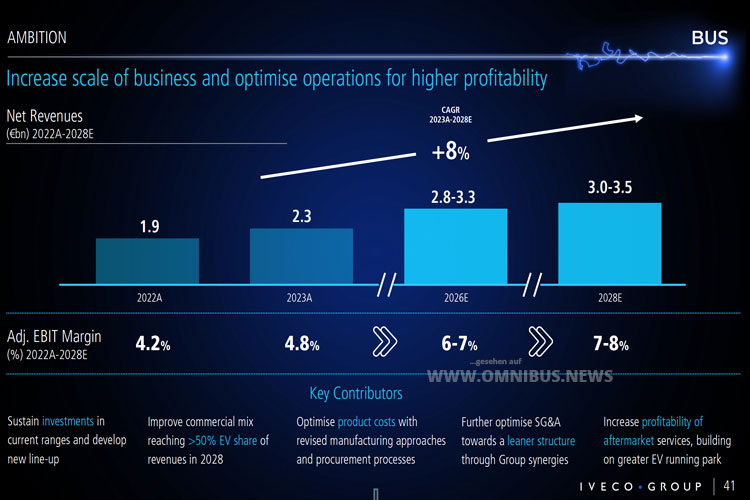
Mit den richtigen Omnibussen ist Ivecos Bussparte auf Erfolgskurs. Foto: IvecoBus
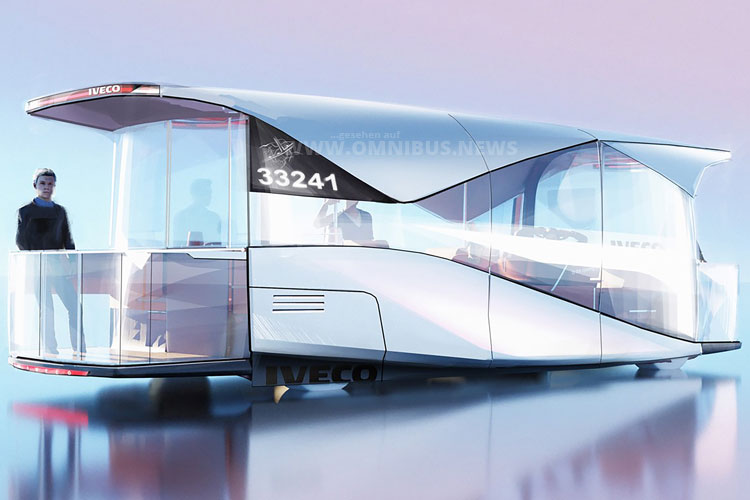
Für die Personenbeförderung der Zukunft hat Iveco Bus viele Ideen, wie das Urban Move Ability-Konzeptfahrzeug, das Traditionelles mit Visionärem vereint, zeigt. Foto: Iveco Bus
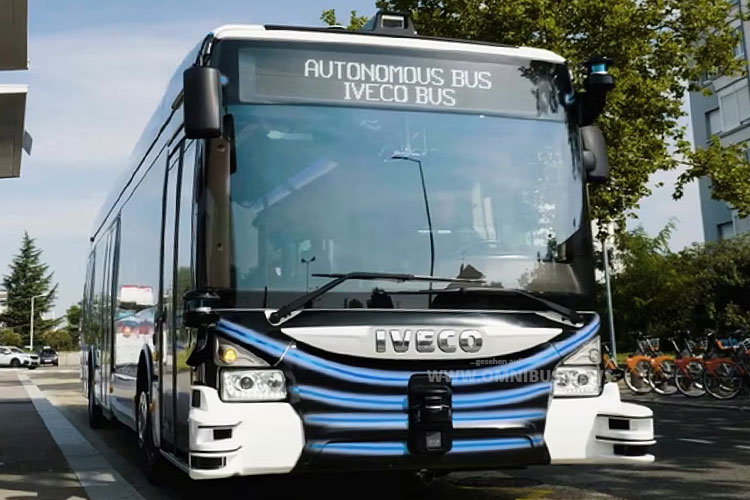
Laut Iveco Bus kann der autonom fahrende Linienbus an die Haltestellen mit einem Abstand von weniger als zehn Zentimetern heranfahren. Foto: Iveco Bus
english version
At yesterday’s Capital Market Day, the Iveco Group (with the bus division Iveco Bus) gave an outlook on an exciting future: the Group is looking positively to the coming years, expecting net sales of 19 billion euros by 2028 – and an adjusted net profit of 0.9 billion euros. But that’s not all: „Today we are committing to a new plan to accelerate our product portfolio, stronger and more diversified partnerships and a greater determination to pursue sustainability,“ said Gerrit Marx, CEO of the Iveco Group, at the start of the event.
He continued: „We continue to invest in the factories in Italy. (…) We are looking at every business where we lack skills and technology. And we are looking for opportunities that help us to work better or faster and that add value to the Group.“ The Iveco Group will invest more than 5.5 billion euros from 2024 to 2028 and will focus on three key areas: Energy transition, artificial intelligence and autonomous driving. The Italian company’s strategic plan also includes an investment of around 600 million euros in advanced technologies for the bus division between 2024 and 2028.
Autonomous driving is not new territory at Iveco Bus: in 2017, Easy Mile joined forces with Sector, Transpolis, ISAE-SUPAERO, the Université Gustave Eiffel, Inria, Michelin and Iveco Bus as part of the STAR project to develop the technology for automating buses. The aim of the collaboration is to develop the first driverless, autonomous standard bus prototype in 2021 that can be operated under realistic conditions. According to Iveco, the prototype has now proven its suitability for autonomous operation on bus rapid transit (BRT) lanes and on private property.
However, the Italians are not resting on their laurels, as Domenico Nucera, President of the bus division of the Iveco Group, made clear yesterday: „We will invest 300 million euros in a modular, electrically powered vehicle architecture. The batteries will be integrated into the vehicle structure. This will enable us to reduce weight, increase passenger capacity and thus further increase the range“. Nucera made it clear that passenger transportation is emission-free for Iveco Bus. Electrically powered city buses should account for 90 % of buses in Europe by 2030, i.e. in just 6 years. The bus market is changing and under pressure, new competitors are approaching and new business models are entering the market.
Nucera made it clear that passenger transportation is emission-free for Iveco Bus. Electrically powered city buses should account for 90 % of buses in Europe by 2030, i.e. in just 6 years. The bus market is changing and under pressure, new competitors are approaching and new business models are entering the market. According to Nucera, the Iveco Group’s bus division is well positioned, with the order backlog for electric buses quadrupling by 2023. And: 1,500 zero-emission buses would be on the order books by the end of 2023. He is also pleased that the new BEV Crossway LE presented last year has been very well received. (IvecoGroup/PM/Sr)
Found an error in the article? Report it now!
